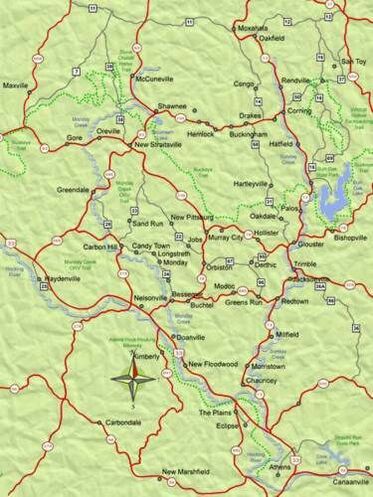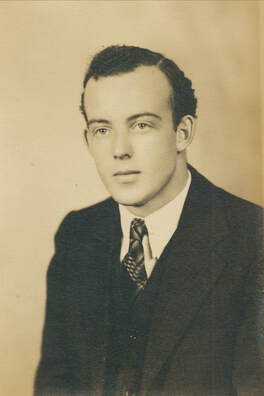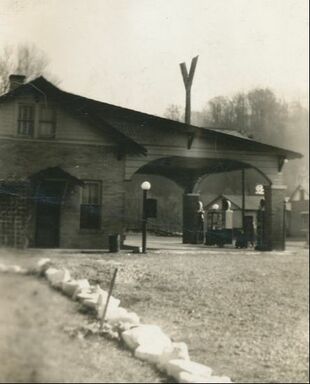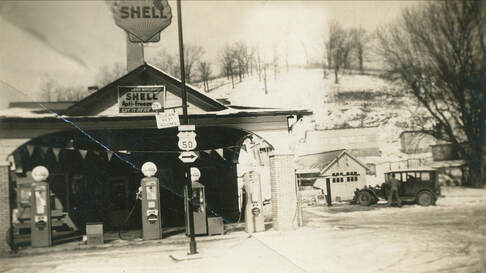 Map of the Little Cities region in southeast Ohio. Map by Chad Seurkamp / www.littlecitiesarchive.org Map of the Little Cities region in southeast Ohio. Map by Chad Seurkamp / www.littlecitiesarchive.org While I expect to continue Yours in a Hurry stories about Anna, Purl, Addison, and Ida, today I want to take you to where my thoughts have lain and share the story of a little-known historical Ohio Appalachian area: The Little Cities of Black Diamonds. It’s where my father was born and raised and to which he felt forever bound. He and his family left in the late 1930’s when much of the work finally dried up.  Olaf I. "Curly" Darnell 1937 Olaf I. "Curly" Darnell 1937 I learned a lot while researching America’s Appalachia. The northern part is culturally different in many ways from the south, forcing me to revise many stereotypes. If you're interested in reading about this yourself, find a copy of The Encyclopedia of Appalachia (Rudy Abramson and Jean Haskell, 2006). It's helping me write fiction based on my father's oral history and photos. Shortly after my mother passed away, the first thing my father asked me to do was take a several-day trip so he could visit every small-town hollow where he’d lived growing up. I’d never seen most of them as my mother, from a small town in mid-Ohio, felt no connection to the area. My then fourteen-year-old son and I watched with trepidation as he would get out of the car at various farm houses, knock on the door, and if someone answered, asked, “Have you lived here long?” If the answer was yes, he’d ask if they remembered his family. One man remembered that dad had worked for his father on the farm during summers when he was in junior high. Another time we parked across the highway from a house dad remembered. As he looked across the highway he smiled and said, “Look at that; (I can’t recall the name) doesn’t look that different after sixty years except for the beard.” The man looked like Santa Claus, about as round as he was tall in a T-shirt covered by suspender overalls. As I’d expected, Mike and I sat in the car about half an hour as the two old friends traded stories. Dad took to this discussion an old photo of a pretty teenage girl he'd brought with him (possibly an early love?). He never told us who was in the photo.  Early "Y" service station Early "Y" service station The most memorable visit was to Mrs. Parsons’ home in Athens. Dad was fortunate enough to graduate from an early auto mechanics class at Chancy Dover in the late 1930’s. That served him well during World War 2 and throughout life. But it really helped him during the Depression when the Parsons asked him to manage a gas station they owned at a unique location: the ‘Y’ at the intersection of state routes 33 and 50 in southeast Ohio. Given the few good roads at the time and the station's location at a main thoroughfare in southeast Ohio, including Columbus and West Virginia, it was a good business. He remembered an Ohio Governor stopping once. During dad’s employment it became Shell Oil. Dad always spoke of the Parsons with deep respect. Meticulously dressed, they were part of Athens society. One of his fondest memories was when they arranged dates with two of their visiting nieces who attended college for dad and a friend of his. Pretty heady stuff for guys in an area where high school was considered an accomplishment. In the early 1950’s, the Parsons visited mom and dad in Akron. Mr. Parsons was on a business trip, buying up property throughout Ohio for the new interstate highways. In 1994, Mr. Parsons was gone. Dad made sure to put on a good shirt the morning the three of us were to visit Mrs. Parsons. The décor of her home reminded me of the Eisenhower farm in Gettysburg—a 1950’s feel. We sat in the back screened-in porch. Mrs. Parsons looked to be in her late 80’s but was still very bright and gracious. She surprisingly brought cookies and lemonade to us on a silver service—a first for Mike. The trip was a unique experience to share with dad. He evidently knew it would be the last time he’d see these people who’d meant so much to him. I’ve made other visits to the Little Cities with professional groups and with my children. I’m fascinated with the area and the history of the once over fifty towns or crossroads that became the Little Cities. Few now live outside the bigger towns like Athens or Nelsonville, but some towns like Shawnee still work to maintain and preserve the structures and history of the boom years—among them Murray City, Glouster, Chauncey, New Straitsville, Buchtel…all have interesting histories. I’ll share some with you. Next Time: Ohio’s ‘Little Cities’ History
Ann Otto writes fiction based on factual as well as oral history. Her debut novel, Yours in a Hurry, about Ohioans relocating to California in the 1910’s, is available on-line at Amazon, Barnes & Noble, Kindle, and at locations listed on her website at www.ann-otto.com. Ann’s academic background is in history, English, and behavioral science, and she has published in academic and professional journals. She enjoys speaking with groups about all things history, writing, and the events, locations, and characters from Yours in a Hurry. She is currently working on her next novel about Ohio’s Appalachia in the 1920’s and prepared for future works by blogging about a recent World War 2 European tour. She can be reached through the website, or on Facebook @Annottoauthor or www.Goodreads.com.
2 Comments
|
Archives
August 2020
Categories
All
|

 RSS Feed
RSS Feed